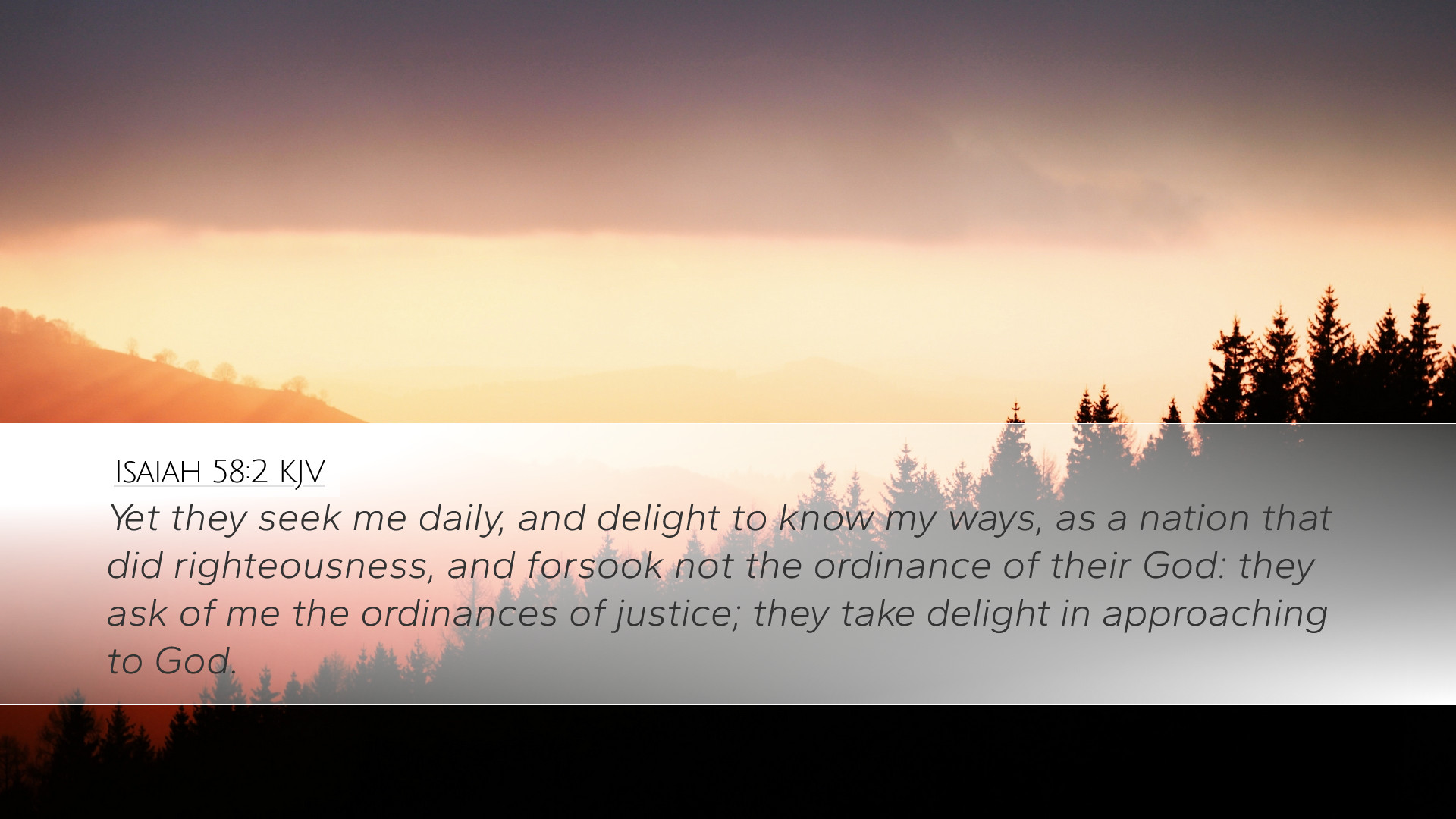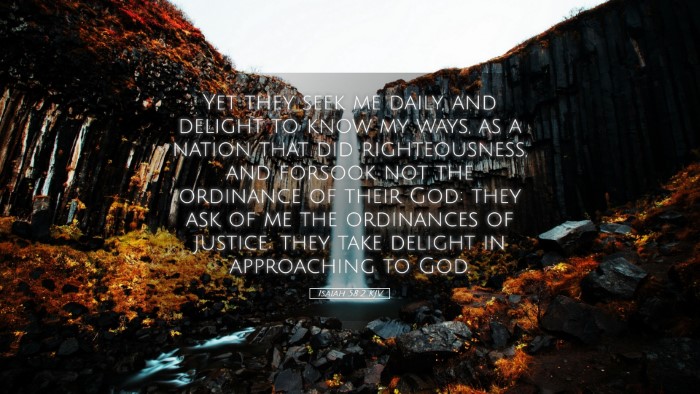Commentary on Isaiah 58:2
Verse: "Yet they seek me daily, and delight to know my ways, as a nation that did righteousness, and forsook not the ordinance of their God: they ask of me the ordinances of justice; they take delight in approaching to God."
Introduction
The book of Isaiah is a profound text that addresses the heart of Israel’s relationship with God. In Isaiah 58:2, the Lord reflects on the people’s superficial religious practices and their misunderstanding of true devotion and righteousness. This commentary aims to dissect this verse and its implications for the faithful, drawing insights from renowned public domain commentators such as Matthew Henry, Albert Barnes, and Adam Clarke.
Contextual Background
Isaiah prophesied during a time when Judah was facing moral decay and impending judgment. The nation was engaged in rituals and outward expressions of piety while neglecting the weightier matters of faith, justice, and mercy. This setting provides a critical backdrop for understanding the true meaning behind their expressions of seeking God.
Insights from Commentaries
Matthew Henry
Matthew Henry emphasizes the duality of worship described in this verse. He notes that while the people appeared to seek God diligently and expressed delight in knowing His ways, their actions contradicted their claims. Their failure to enact righteousness and to follow God's statutes reveals a heart unaligned with true worship.
- Seeking God: Henry points out that the phrase "seek me daily" suggests a habitual, yet superficial approach to worship without genuine engagement.
- Delight in God’s Ways: The enthusiasm for knowing God's ways did not translate into a commitment to living them out in justice and mercy.
- Outward vs. Inward Religion: This highlights Henry's assertion that God desires a heartfelt religion that translates into ethical living.
Albert Barnes
Albert Barnes provides a critical analysis of the people’s perception of righteousness. He argues that their sense of “righteousness” was based more on external adherence to rituals rather than an internalized love of God's laws.
- Nation Righteousness: Barnes interprets "as a nation that did righteousness" as a stark contrast to the reality of their spiritual condition, noting their need for God’s grace to transform their hearts.
- Inquiry for Justice: The inquiries made by the people, “they ask of me the ordinances of justice,” reveal a desire for religious knowledge but not a willingness to implement that knowledge into life.
- Approaching God: Barnes concludes that while they delighted in approaching God, their approach was marred by hypocrisy; the genuine relationship with God was absent.
Adam Clarke
Adam Clarke offers a detailed exegesis of the text, pointing out the irony in the people's actions. They seek God and claim to desire His ordinances, but their lives do not reflect a commitment to His commands.
- Daily Seeking: Clarke highlights that a “daily” seeking can often be more about habit than genuine reverence.
- Delight without Action: The attitude of delight is significant, yet Clarke maintains that it is shallow without the foundation of obedience and justice.
- God's Ordinances: Clarke also notes that understanding what God requires is not sufficient; living according to those requirements is where true righteousness lies.
Theological Implications
This verse raises critical evaluations for modern-day religious experiences. The core questions it poses are relevant for pastors, students, theologians, and Bible scholars alike:
- What does true worship entail? Are we faking functionality in our faith, or are we genuinely engaging with God's heart?
- How do we reconcile knowledge of God’s commandments with our daily actions? There’s a clear call for self-examination regarding the alignment of heart, mind, and deeds.
- What leads to a transformative relationship with God? This inquiry beckons a deeper relationship rooted in love and commitment rather than mere ritualistic practices.
Conclusion
Isaiah 58:2 serves as a poignant reminder that external adherence to religious practices is insufficient for a true relationship with God. Through the insights of Matthew Henry, Albert Barnes, and Adam Clarke, we are called to examine our motivations and actions. The verse implores us to seek a deeper understanding of righteousness that translates into a lived expression of faith, grounded in love and justice.


